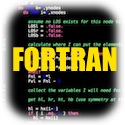Updating CPU Timing Functions Using gfortran

I've been working on my old simulation code a bit in the evenings and weekends now, just seeing if I could get the GaAs simulations to predict the oscillations of the 1D code. One of the things that hasn't bothered me - until now, is the timing methods used in the code. After all, I can time it on the wall clock and see how long it's taking, but I put in a decent level of effort all those many years ago to get the CPU split times for each phase of the simulation, and I thought it'd be nice to get them correct again.
I say 'again', because in the old f77 days, I'm sure dtime() was about as good as you could get. But in these new days of gfortran the values returned from dtime() are not in keeping with reality. I've looked at the GNU Fortran docs, and they say it's meant to return the elapsed seconds, but it's not. Maybe it's the build of gfortran I'm using, but I think it's more likely that dtime() is not what the new standard is using and I needed to move on.
So I did some digging in the code. Turns out F95 defined cpu_time() which returns the elapsed CPU seconds (as a real) for the execution of the app. This means that we need to put it into the code in a 'difference' mode - taking a reading at the top of the loop, and then at the bottom, and differencing the two for the incremental time that I was used to getting from dtime().
This wasn't all that hard, and in about an hour I had all the code re-fitted for the calls to cpu_time(). Thankfully, this is a much better timer and I get results that are making sense with the wall clock time I'm seeing for the runs. It's not like it's running any faster, or getting better answers, but it is at least more consistent, and I can look at the numbers and see what's more costly and from that see what I might need to do to alter the bias stepping, etc. Not amazing, but nice.